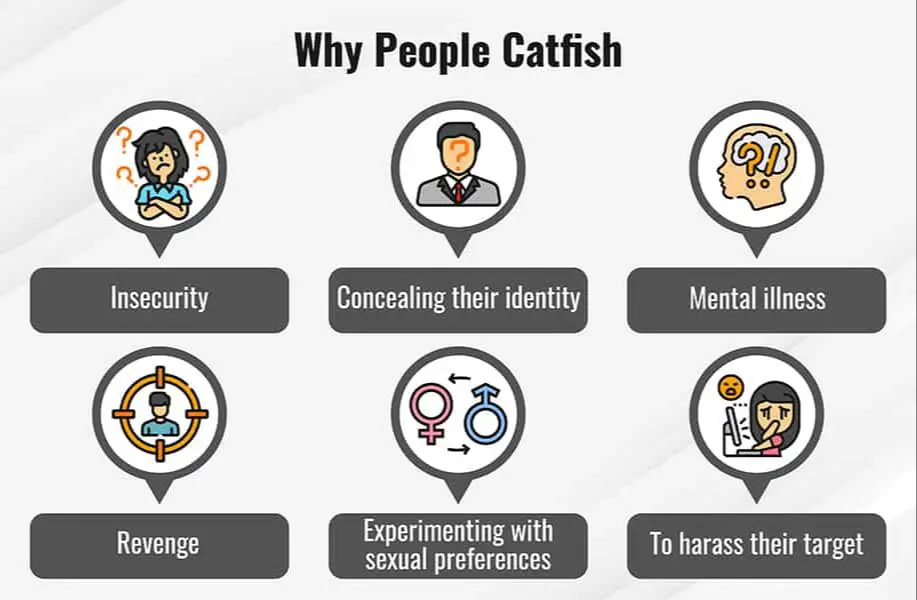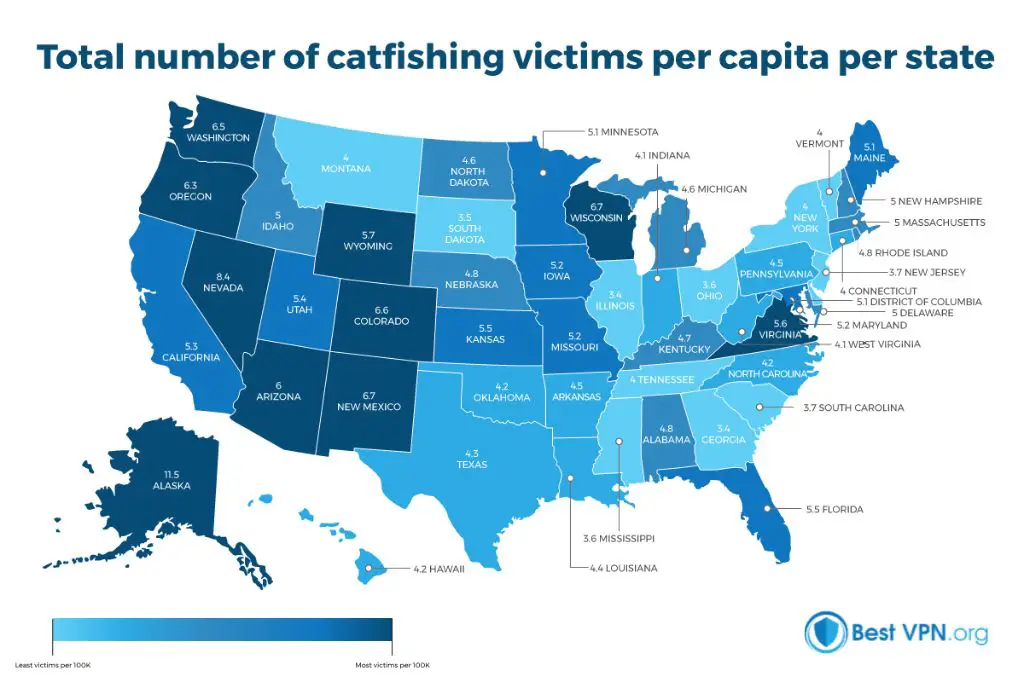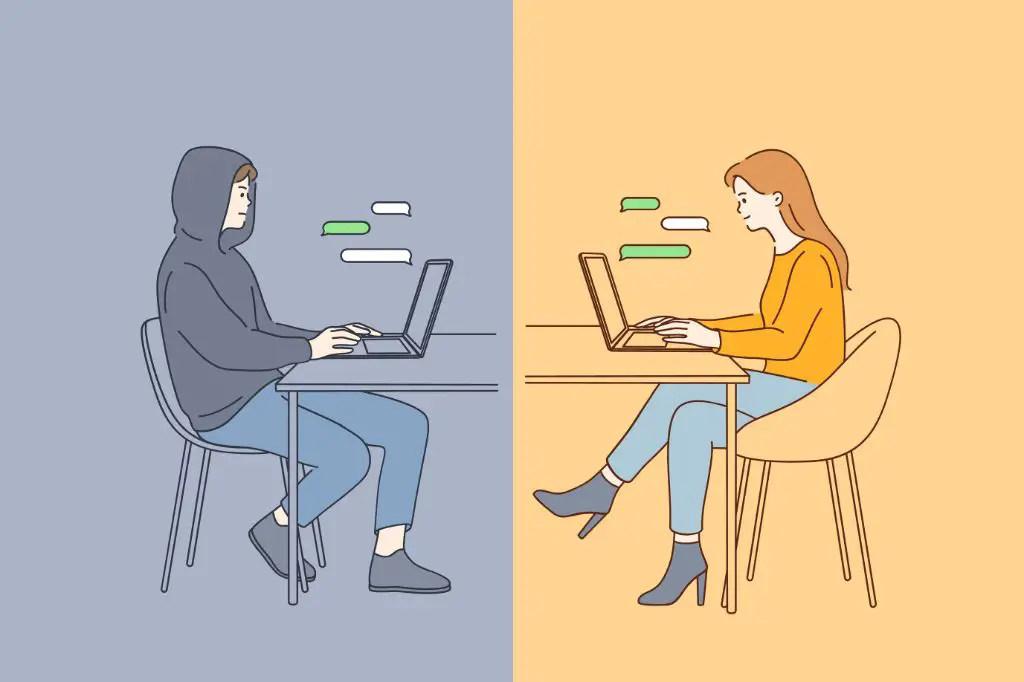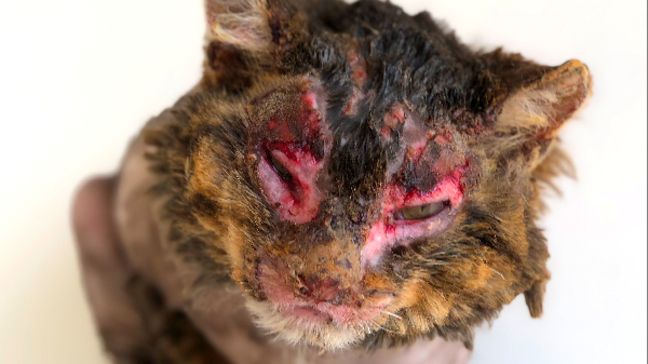What is Catfishing?
Catfishing refers to the practice of creating fake online identities or personas and using them to lure people into relationships. The term catfishing was inspired by fishermen who used catfish as “bait” to catch bigger fish. In the online world, catfish create elaborate fake profiles on social media and dating sites to form relationships under false pretenses.
According to the Cambridge English Dictionary, catfishing is defined as “the activity of creating fake personal profiles on social media sites to form relationships with people without them knowing who you really are.”
Catfishing is most commonly associated with online dating. Catfish will use someone else’s photos and fabricated personal details to create fake dating profiles. They do this in order to attract partners they normally wouldn’t be able to attract with their real identity. The motives behind catfishing range from seeking attention and validation to financial fraud or identity theft. But in many cases, catfish simply want to live out an online fantasy relationship that they know couldn’t happen with their real self.
The goals of a catfish are to gain trust and build an intimate connection without revealing their true identity. They aim to cultivate emotional dependence in the other person so the catfished individual falls in love with the catfish’s fake persona. This provides the catfish with satisfaction, power, and control, even though it is based on deceit.
Motivations Behind Catfishing

Catfishing is when someone pretends to be someone else online, often with deceptive motivations. According to SocialCatfish.com, some of the most common motivations behind catfishing include:
Loneliness – Catfish often pretend to be someone else because they are lonely and want to fulfill their emotional needs by creating fake relationships and connections. They may feel isolated or have low self-esteem, so they catfish to compensate for what’s missing in real life. According to an article on PsychologyToday.com, catfishing provides a powerful antidote to loneliness by allowing people to escape into fantasy relationships.
Boredom – Some people catfish simply because they are bored and want to live vicariously through a fake identity. It can be exciting and entertaining for them to take on a different persona. As explained in this Quora post, catfishing can provide an escape from the monotony of everyday life.
Revenge – In some cases, catfishing is used as a means of getting revenge on someone by manipulating their emotions. As covered in this SocialCatfish.com article, a catfish may target someone who broke their heart or rejected them in order to get payback by deceiving them and playing with their feelings.
Financial gain – Catfishing can also be used for financial fraud and scams. As noted in this HuffPost article, some catfish create fake identities and relationships to manipulate people into sending them money.
Prevalence of Catfishing

Catfishing is unfortunately quite common, especially among online dating app users. According to one survey, 41% of U.S. adults who are online daters have been catfished (Source). Another study found that about 23% of women and 38% of men admit to having catfished someone before (Source). Dating apps are the most common place for catfishing to occur, with Tinder, Bumble, and Hinge having the highest rates.
Men are disproportionately more likely to engage in catfishing than women. According to Psychology Today, men catfish others approximately three times as often as women do (Source). However, the demographics of catfish victims are more evenly split between genders.
In terms of age, young adults are the most frequent catfishers and victims. People aged 18-29 account for about 50% of catfishing cases. This is likely because younger generations use online dating apps and social media more heavily, increasing exposure.
Signs Someone is Catfishing
There are a few common signs that someone may be catfishing you online. Some of the most telling signs include inconsistencies in the details they share about their life, refusal to video chat, and images that seem off.
People who are catfishing tend to stumble over remembering details they’ve shared previously about where they live, work, or go to school. If you notice inconsistencies in the stories they tell over time, it could be a red flag. Catfishers also tend to avoid video chatting, making excuses for why their camera is broken or why they can’t talk on the phone. If someone refuses to verify their identity via live video, be wary.
Another sign is if the photos seem inconsistent or suspicious. Catfishers often use fake photos or photos of attractive models. You may notice details in the background don’t match up or the quality seems off. Doing a reverse image search on the photos could reveal if they’ve been taken from somewhere else online.
Trust your instincts if you notice odd behaviors like being secretive, avoiding personal questions, or being inconsistent. While not definitive proof, these signs could indicate catfishing and signal it’s wise to proceed with caution.
Real-Life Catfishing Examples
Some of the most well-known real-life examples of catfishing include:
The case of Manti Te’o, a football player for Notre Dame, who was tricked into having an online relationship with a fictional woman named Lennay Kekua. Te’o believed Kekua had died of cancer, only to later discover she never actually existed and was fabricated by Ronaiah Tuiasosopo as an elaborate catfishing hoax.
Angela Wesselman, who was the subject of the 2010 documentary film Catfish. Wesselman created a fake online persona named Megan to trick photographer Nev Schulman into an online relationship. The movie brought the term “catfishing” into popular culture.
Other high-profile catfishing cases have involved celebrities like former NHL player Chris “Birdman” Andersen, NFL player Manti Te’o, and singer Casey Donovan. These examples demonstrate how easy it is to fall victim to false online identities and the potentially devastating emotional effects.
Psychological Effects of Being Catfished

Being “catfished” can lead to serious psychological effects on victims. The experience often leaves them feeling betrayed, damaging their ability to trust others in the future. Victims can feel embarrassment and shame when they discover the person they thought they were connecting with was fake.
As discussed in an article on LinkedIn The Psychology of a Catfisher, catfishing can be traumatic and lead to issues like anxiety and depression in victims. The repeated violation of trust that occurs during catfishing leaves victims suspicious and cynical. They can develop deep uncertainties about the true motivations and identities of new people they meet.
An article on Bustle explains how catfishing affects the brain. The trauma of discovering the deception triggers the brain’s threat response. This makes it difficult for victims to rationally process what happened and leads to lingering fears. Victims may compulsively ruminate on the situation and have trouble letting it go.
As summarized on the Bullies Out website, catfishing can have serious mental health effects like anxiety, depression, and emotional distress. The loss of trust and increased suspicion after being catfished can be very disruptive to a victim’s sense of safety and wellbeing. With help from supportive friends and mental health professionals, victims can recover and regain confidence to build trust again.
How to Avoid Being Catfished
There are several steps you can take to avoid being catfished on dating apps and social media:
Perform a reverse image search on the person’s profile pictures. Many catfish use photos stolen from elsewhere online. Using Google Images or tools like TinEye, you can search to see if the photos appear elsewhere on the web. If the pictures are associated with other names or profiles, that’s a red flag.
Look for inconsistencies in what they tell you about themselves. If details about their job, interests, location seem contradictory or change frequently, they may be fabricating information. Press for specifics and see if their story holds up.
Video chat before agreeing to meet in person. Many catfish will avoid showing their real face on live video. Insist on a video call so you can verify they actually look like their photos.
According to an article on GetFilterOff.com1, additional precautions like doing an online background check, asking for tagged photos, and taking things slowly can also help avoid being catfished.
What to Do If You’ve Been Catfished
If you discover that someone has been catfishing you, there are a few important steps to take:
First, confront the catfisher if you feel comfortable doing so. Be direct and explain that you know they have been lying about their identity. Demand they come clean and reveal who they really are. If needed, present evidence that exposes their deception. Make it clear the relationship is over because of their dishonesty. While confrontation provides closure, only do so if you think the catfisher will respond appropriately.
Next, report any fake social media accounts or dating profiles to the platforms so they can be removed. Provide proof that the profiles are fraudulent when submitting your claim. Getting catfishing accounts deactivated helps prevent the scam from continuing and hurting others. According to https://www.datingforreal.com/advice/how-to/catfish/, reporting fake accounts is an important step.
Finally, seek support from friends, family, or professionals to process the emotional impact. Speaking with trusted loved ones provides validation after the betrayal of catfishing. Therapists can also help work through complex feelings and trauma associated with being deceived. It may be beneficial to join support groups with others who have gone through similar catfishing experiences. You do not have to cope alone. As noted by https://hernorm.com/how-to-deal-with-being-catfished/, seeking support can help deal with the effects of catfishing.
Confronting the catfisher, reporting fake accounts, and seeking support are constructive ways to respond after discovering you’ve been catfished. With the right help and precautions, you can move on from the unfortunate deception.
Legal Consequences of Catfishing
While catfishing itself is not illegal, certain actions associated with catfishing can have legal repercussions. If a catfisher uses someone’s identity or photos without permission to create a fake profile, the victim may be able to pursue legal action for identity theft or copyright infringement (https://www.investopedia.com/terms/c/cat-fishing.asp).
Catfishing can also be considered a form of fraud if the catfisher gains financially from their deception. For example, if the catfisher convinces the victim to send money under false pretenses, they may face fraud charges. According to one source, catfishing for financial gain is illegal and can result in felony fraud charges (https://www.findlaw.com/litigation/filing-a-lawsuit/can-i-sue-someone-for-catfishing-me-.html).
In some cases, victims of romantic deception have pursued civil lawsuits against their catfisher for emotional distress or fraudulent misrepresentation. While these cases are difficult to win, the victim may be awarded monetary damages if the catfisher’s actions are ruled intentionally harmful.
How to Move On After Being Catfished

Being catfished can be an emotionally traumatic experience. It’s important to allow yourself time to process your emotions and heal. Here are some tips for moving forward:
Allow yourself to process the emotions. Feelings of hurt, anger, embarrassment and betrayal are normal. Don’t try to suppress these emotions. Talk to trusted friends and family about what you’re going through.
Be kind to yourself. Don’t blame yourself for being deceived – catfishers are skilled manipulators. Recognize that you were taken advantage of. Refocus your mental energy on self-care and healing.
Seek closure. If possible, confront the catfisher to understand their motivations. Make it clear the relationship is over and cease all contact. Block them on all platforms so they can’t continue the deception.
“How should I move on from being catfished?” https://www.quora.com/How-should-I-move-on-from-being-catfished
Recovery takes time. Surround yourself with supportive people. Try new hobbies and focus on personal growth. With self-compassion, the sting of being catfished will fade.

